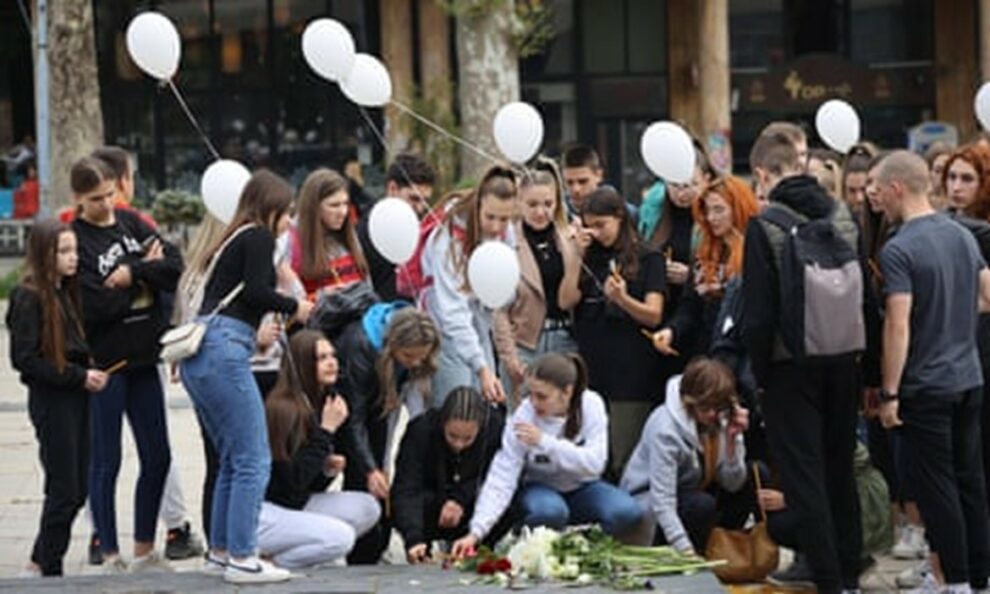Shootings in a school in Belgrade and a day later in a rural area left 17 people dead and 21 injured
Funerals are being held in Serbia for some of the victims of two mass shootings that happened in just two days this week, leaving 17 people dead and 21 injured, many of them children.
The shootings on Wednesday in a school in Belgrade and on Thursday in a rural area south of the capital city have left the nation stunned with grief and disbelief.
Though Serbia is awash with weapons and no stranger to crisis situations after the wars of the 1990s, a school shooting like the one on Wednesday has never happened before. The most recent previous mass shooting was in 2013 when a war veteran killed 13 people.
On Wednesday, a 13-year-old boy opened fire on his fellow students, killing seven girls, a boy and a school guard. A day later, a 20-year-old man fired randomly in two villages in central Serbia, killing eight people.
Authorities have promised a gun crackdown and said they would boost security in schools. Thousands lit candles and left flowers near the shooting site in Belgrade, in an outpouring of sadness and solidarity.
Serbian media reported that four of the eight children killed in the school shooting, as well as the Vladislav Ribnikar school guard, will be buried at cemeteries in Belgrade on Saturday, the second day of a three-day mourning period for the victims.
About 30 miles (50km) to the south, a mass funeral service will be held in the small village of Malo Orašje for five young men who were killed in the shooting rampage on Thursday evening. Villagers told Serbian media the tragedy was too huge to handle.
“Five graves! He [the killer] shut down five families,” one villager told N1 television. “How could this happen?”
Serbian police have said the suspected gunman stopped a taxi after his rampage and made the driver take him to a village farther south, where he was arrested on Friday. Officers later said they found weapons and ammunition in two houses he was using there.
The motive for both shootings remained unclear. The 13-year-old boy has been placed in a mental health clinic, too young to be criminally charged. His father was arrested for allegedly teaching his son to use guns and not securing his weapons well enough.
The suspected village gunman wore a pro-Nazi T-shirt, authorities said, and complained of “disparagement”, though it was unclear what he meant. The populist leader Aleksandar Vučić promised the “monsters” would “never see the light of day again”.
Those injured in the two shootings have been hospitalised and most have undergone complicated surgical procedures. A girl and a boy from the school shootings remain in serious condition, and the village victims are stable but under constant observation.
The school shooting left six children and a teacher wounded, while 14 people were injured in the villages of Malo Orašje and Dubona. The dead in Dubona included a young, off-duty police officer and his sister.
The free press is under attack from multiple forces. Media outlets are closing their doors, victims to a broken business model. In much of the world, journalism is morphing into propaganda, as governments dictate what can and can’t be printed. In the last year alone, hundreds of reporters have been killed or imprisoned for doing their jobs. The UN reports that 85% of the world’s population experienced a decline in press freedom in their country in recent years.
This week marks the 30th annual World Press Freedom Day, a day for everyone to reflect on the importance of free expression as fundamental for all other rights. It is also an opportunity to pledge support for independent media – because without a robust and free press, a healthy democracy is impossible.
As you’re joining us today from Indonesia, we hope you will consider marking this day by supporting the Guardian. Despite the financial challenges plaguing the media industry, we’ve decided to keep our journalism paywall-free, because we deeply believe everyone has the right to access high-quality, fact-checked reporting. And we maintain our independence thanks to generosity from readers all over the world, who understand that supporting the free press is an investment in an informed and empowered public.
Unlike many others, we have no billionaire owner – this helps us maintain the freedom to fearlessly chase the truth and report it with integrity. Your support will allow us to continue to work with trademark determination and passion to bring you journalism that’s always free from commercial or political interference.
We also encourage you to support one of the many, smaller independent news organisations around the world. Over the years, we’ve collaborated with teams who are often publishing quality reporting in the face of great adversity. We have shared our expertise with them, helping to start and grow their own reader funding models. If this interests you, find out more about our work with outlets in Russia, Belarus, Ukraine, Turkey, Hungary and beyond.
Today we ask you to power Guardian reporting for the years to come, whether with a small sum or a larger one. If you can, please support us on a monthly basis from just $2. It takes less than a minute to set up, and you can rest assured that you’re making a big impact every single month in support of open, independent journalism. Thank you.
Source: theguardian










